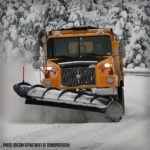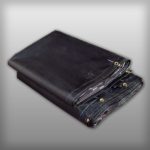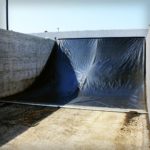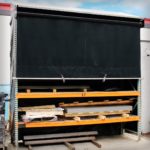Hauling Industry News
Tarping your Construction Loads during Winter Months
Story by Erin Zaske / www.metalconstructionnews.com
 Avoid corrosion to metal building materials caused by severe weather
Avoid corrosion to metal building materials caused by severe weather
During the winter months, many highway maintenance departments have altered the method of clearing ice and snow from highways and bridges with chemical deicers in lieu of rock salt, slag and sand. Instead, more are using chemicals such as liquid calcium chloride or liquid magnesium chloride to prevent dangerous driving conditions. The use of deicers is increasing throughout the country, including becoming a more accepted practice in the deeper southern regions of the U.S.
While these deicers are very effective in clearing the roads and improving public safety, they are extremely corrosive. These chemicals, with the right mixture of water or spray, may reach the steel, creating rust or pitting. Think about what they do to vehicles not properly cleaned in a timely manner. The impact these deicers have on the primer applied to steel and painted sheeting products as the material is transported to the job site is very harsh.
 Importance of Tarping
Importance of Tarping
There is a very effective and easy way to avoid corrosion to your metal building materials caused by these severe conditions. If a project will be shipping during winter months, and especially through inclement weather, it is recommended to tarp loads. Oftentimes, the manufacturer leaves the decision up to you whether or not to tarp your loads, and it can come with a minimal charge. However, if you choose not to tarp your loads, the manufacturer cannot be held liable for the conditions of the primed steel, any damage to the panels or all other materials on the trailer that may have come into contact with the deicers.
The primer is a temporary coating designed to protect steel during the shipping and erection process for normal atmospheric conditions, not for exposure to corrosive chemicals. If you are planning to pick up material from the manufacturer and transport it yourself, make sure you have the proper tarping materials to avoid the harsh road conditions. It is also easier to apply warm tarps than those that have been transported or sitting in the cold. If possible, bring them inside the cab of the truck to let them warm up as you drive.
Be sure to check your D-rings and grommets regularly while transporting your materials, as they are especially prone to damage from the deicers. Make sure the tarp is taut to avoid areas where water can pool. When temperatures are hovering above freezing and then freeze at night when the temperatures fall; water can freeze and rip a hole into the tarp.
GET YOUR PULLTARPS UNIVERSAL THROW TARP—>

 Job-site Protection
Job-site Protection
The use of tarps for transporting materials to job sites not only protects the building products, but it can be delivered during winter months, as long as site preparation has been completed prior to the ground freezing. This allows for construction to take place during this time, leading to earlier
business starts for your customers.
It is important that you are prepared to accept delivery and have proper storage on the site to protect materials from natural elements, such as preventing metal roof and wall panels from sitting in areas where water pools when snow melts. Also, by keeping the structural members covered prior to fabrication, you can avoid water pooling in these members, which can lead to corrosion of the primer or cause them to rust.
It is important to take all weather elements into consideration when you are ready to take shipment of your metal building. If you are unsure of whether or when to have your materials tarped, speak with your metal building manufacturer to learn best practices. Also discuss proper storage of materials once the building has arrived at the job site.
LOOKING FOR BUNKER STORAGE PROTECTION, GIVE OUR CUSTOMER SERVICE TEAM A CALL AT 877-284-6365.